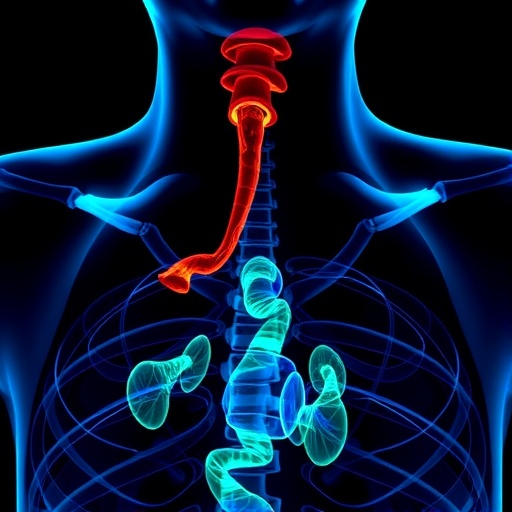In recent advances in cancer treatment, the combination of neoadjuvant immunotherapy and chemotherapy has emerged as a powerful strategy, particularly for esophagus cancer. Despite its promising results, a critical need persists to accurately identify which patients will derive maximal benefit from such therapies. A groundbreaking study now sheds light on this challenge by pinpointing serum CD80, a peripheral circulating protein, as a predictive biomarker for the efficacy of neoadjuvant PD-1 blockade combined with chemotherapy in esophageal cancer patients.
Esophageal cancer remains a formidable malignancy with high morbidity and mortality rates worldwide. The advent of immune checkpoint inhibitors, notably PD-1 blockade therapies, has revolutionized treatment paradigms. However, the heterogeneity of response among patients underscores the urgency for precise biomarkers that can guide personalized treatment plans. The research team, led by Wu et al., focused on the peripheral blood proteomic landscape to interrogate potential predictors of therapeutic response.
The study incorporated a two-cohort design involving a discovery group of 46 esophageal cancer patients and a validation cohort of 28 patients, all undergoing neoadjuvant PD-1 immunotherapy combined with chemotherapy. Their comprehensive approach involved quantifying 55 peripheral blood features, encompassing both complete blood count parameters and a spectrum of serum proteins, to identify correlations with treatment outcomes.
Key findings revealed that patients exhibiting high baseline levels of serum CD80 demonstrated significantly better response rates to the combined neoadjuvant therapy. Receiver Operating Characteristic (ROC) curve analysis yielded an area under the curve (AUC) of 0.686 in the discovery cohort, underscoring the potential of CD80 as a predictive marker. This predictive capability was further substantiated in the independent validation cohort, where CD80’s AUC rose to 0.778, indicating robust reproducibility and clinical relevance.
Delving deeper into the tumor microenvironment, the researchers unveiled intriguing immunological correlations associated with serum CD80 levels. Specifically, patients with elevated CD80 exhibited increased infiltration of CD8+ cytotoxic T lymphocytes and reduced neutrophil presence within tumor tissues. This immunological milieu is suggestive of a more effective anti-tumor immune response, potentially underpinning the heightened therapeutic efficacy observed.
Additionally, the study explored longitudinal changes induced by neoadjuvant therapy by analyzing pre- and post-treatment samples through transcriptome sequencing and PD-L1 immunohistochemistry. Intriguingly, patients with low serum CD80 levels demonstrated a significant increase in induced regulatory T cells (iTregs) and PD-L1 expression post-treatment, alongside a marked decrease in the MHC class I signature score. These alterations could signify an immunosuppressive tumor microenvironment and impaired antigen presentation, possibly contributing to inferior responses.
The identification of serum soluble CD80 as a non-invasive biomarker holds immense clinical promise. Unlike tissue biopsies, peripheral blood sampling is minimally invasive, repeatable, and easily integrated into clinical workflows, facilitating real-time monitoring of patient responses. This biomarker could thus serve as a pivotal tool for stratifying patients likely to benefit from neoadjuvant PD-1 blockade plus chemotherapy, optimizing therapeutic decisions, and improving patient outcomes.
Moreover, the mechanistic insights from the study enrich our understanding of the complex interplay between systemic immune components and local tumor immunity. CD80, as a costimulatory molecule expressed on antigen-presenting cells, plays a critical role in T-cell activation and immune surveillance. Its elevated presence in circulation may reflect a heightened state of immune readiness, priming patients for effective immunotherapeutic responses.
The implications of this research extend beyond esophageal cancer, potentially influencing biomarker discovery in other malignancies where immunotherapy is integral. It highlights the power of proteomic profiling combined with transcriptomic and histopathologic analyses to unravel novel predictive markers and elucidate immune mechanisms governing therapy responsiveness.
Importantly, the study emphasizes the heterogeneity of immune landscapes among patients and the dynamic modulation of immune checkpoints during treatment. Monitoring such changes could enable adaptive therapeutic strategies, including combination regimens or immune modulators targeting specific pathways like Tregs or PD-L1, tailored to individual immune profiles.
This study opens avenues for future research to validate serum CD80 across larger, multi-center trials and diverse patient populations. It also suggests exploring potential interventions that might modulate CD80 levels or harness its pathway to enhance immunotherapy efficacy. Integration of such biomarkers into clinical practice will be a major stride towards precision oncology.
In summary, the pioneering work by Wu and colleagues underscores serum CD80 as a valuable prognostic and predictive biomarker in neoadjuvant PD-1 blockade combined chemotherapy for esophageal cancer. These findings empower clinicians with a non-invasive tool to better personalize treatment, optimize responses, and ultimately improve survival outcomes in this challenging cancer.
With ongoing advancements in proteomic technologies and bioinformatics, the identification and application of circulating biomarkers like CD80 heralds a new era of immune-based cancer therapeutics. The convergence of immunology, molecular biology, and clinical oncology augurs well for transforming esophageal cancer management from a one-size-fits-all approach to a tailored precision therapy paradigm.
As research continues, the integration of peripheral circulating biomarkers with imaging, genomic, and clinical data will likely refine predictive models and treatment algorithms. This comprehensive approach promises to accelerate the journey toward durable cancer remission and enhanced quality of life for patients worldwide, marking a significant milestone in cancer immunotherapy.
Subject of Research: Biomarkers predicting efficacy of neoadjuvant PD-1 blockade combined with chemotherapy in esophagus cancer.
Article Title: Peripheral circulating proteomic profiling reveals serum CD80 is positively correlated with the efficacy of neoadjuvant PD-1 blockade combined with chemotherapy for esophagus cancer.
Article References:
Wu, L., Pan, C., Wang, W. et al. Peripheral circulating proteomic profiling reveals serum CD80 is positively correlated with the efficacy of neoadjuvant PD-1 blockade combined with chemotherapy for esophagus cancer. BMC Cancer 25, 1608 (2025). https://doi.org/10.1186/s12885-025-14874-7
Image Credits: Scienmag.com




